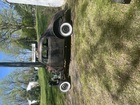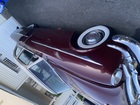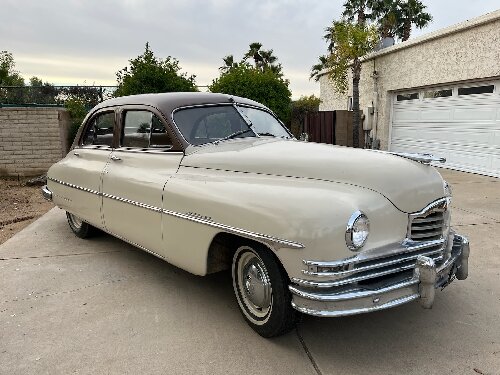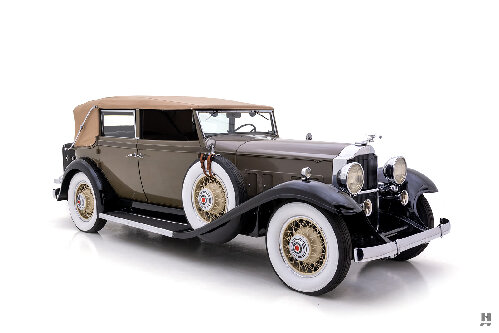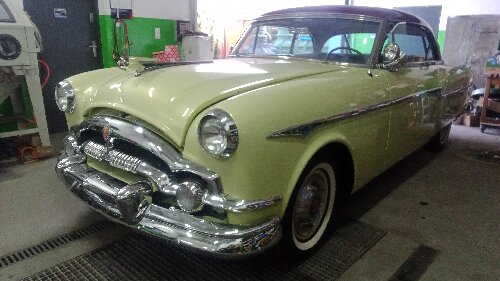|
Re: Collapsed Lifter Syndrome
|
||||
|---|---|---|---|---|
|
Webmaster
|
Not sure which 327 you have, if you can tell us the serial number on the block that would help. For 1953 it should start with an "L". If you have solid lifters then may need an adjustment. If hydraulic you may have a collapsed one.
Posted on: 2011/9/13 12:00
|
|||
|
-BigKev
1954 Packard Clipper Deluxe Touring Sedan -> Registry | Project Blog 1937 Packard 115-C Convertible Coupe -> Registry | Project Blog |
||||
|
||||
|
Re: Collapsed Lifter Syndrome
|
||||
|---|---|---|---|---|
|
Home away from home

|
The cam does not have to be removed in order to remove a hydraulic plunger, it has to be removed to remove a solid lifter or the cam follower for the hydraulic lifter.
Posted on: 2011/9/13 14:35
|
|||
|
||||
|
Re: Collapsed Lifter Syndrome
|
||||
|---|---|---|---|---|
|
Home away from home

|
Dear Gator:
Before you condemn lifters, consider these additional causes of your symptoms: a) Sticky valves caused by corroded stems and guides. If you think you have a lifter problem then pull a valve cover and check the action from underneath the fender. If you have a lifter problem you should be able to get a feeler gauge under the fully closed valve. Also lifter collapse will be visual. Somewhere in the Packard manuals they state that your compression readings are most likely caused by to little valve lash, thus I would suspect a sticky valve. Even when hot. Good luck with your car
Posted on: 2011/9/13 17:25
|
|||
|
||||
|
Re: Collapsed Lifter Syndrome
|
||||
|---|---|---|---|---|
|
Home away from home
|
Thanks Big Kev, fred and Tim for your responses. First, the engine is #L302309. I suspect a collapsed lifter only because the tap disappears at higher engine speeds but that doesn't mean it couldn't be a partially sticking valve so I certainly don't disagree with your theory Tim and had planned on pulling the valve covers for further inspection and to chack and observe valve train operation. Fred, If it does prove to be a collapsed lifter then the possibility of removing just the plunger would definitely be the most attractive option short of pulling the cam and I was hoping for a confirmation on that approach so at this point, all I need is some extra time and a little luck. Thanks again guys, appreciate the input!
Posted on: 2011/9/13 19:11
|
|||
|
||||
|
Re: Collapsed Lifter Syndrome
|
||||
|---|---|---|---|---|
|
Home away from home

|
Except in very unusual situations, it is absolutely unnecessary to remove the cam and valve tappett if there is a defective hydraulic lifter. A ticky valve that disappears at higher rpm's may be that it just can't be heard whien the engine is making lots of noise.
Remove the lf wheel and fender apron and valve covers. Yoiu will be able to "feel" the ticky lifter with your fingers or find it with a listening stick or long screw driver. If the valve is sticky form long storage, spray some WD40 or similar on the bottom of the guide
Posted on: 2011/9/13 19:33
|
|||
|
||||
|
Re: Collapsed Lifter Syndrome
|
||||
|---|---|---|---|---|
|
Home away from home
|
Fred, I should have said that the "slight roughness" that can be felt at an idle disappears at higher engine speeds...in other words, when sitting in the drivers seat and bringing the RPM's up, the engine smooths out but the tap can still be heard. You really wouldn't suspect anything was wrong when you punch it, it responds instantly with no hesitation but that tap, tap, tap and putt, putt, putt, doesn't belong in the recipe for a correctly running straight 8 or any other engine that's performing like it's supposed to.
Posted on: 2011/9/13 19:54
|
|||
|
||||
|
Re: Collapsed Lifter Syndrome
|
||||
|---|---|---|---|---|
|
Home away from home
|
Fred, I had a length of vaccuum hose in my ear and held the other end around various points along the valve covers...it's definitely coming from around midway of the valve train which is another reason why I suspect #4. I have a direction to go in now and appreciate your sharing the information about the lifter...a sigh of relief was in order knowing that the lifter plunger can be removed without removing the entire lifter (if it comes to that) but I'm hoping it's a sticking valve as it will be much easier to free up
Posted on: 2011/9/13 20:07
|
|||
|
||||
|
Re: Collapsed Lifter Syndrome
|
||||
|---|---|---|---|---|
|
Webmaster
|
Your motor is a '53 327, 5 bearing, solid lifter motor. Virtually the same as my '54 M3xxxxx motor. I bet you have a loose valve that needs adjusting. Exactly the same problem I had.
Posted on: 2011/9/13 20:15
|
|||
|
-BigKev
1954 Packard Clipper Deluxe Touring Sedan -> Registry | Project Blog 1937 Packard 115-C Convertible Coupe -> Registry | Project Blog |
||||
|
||||
|
Re: Collapsed Lifter Syndrome
|
||||
|---|---|---|---|---|
|
Home away from home
|
Quote:
Well that's a blow to my theory...a solid lifter equipped engine afterall and as loud as the tapping is, I would have bet on it being a collapsed hydraulic lifter. Don't get me wrong though, it's good news in the sense that hopefully, it is just a matter of adjusting the valve and I would certainly count my blessings if it turns out to be just that. I just wonder how far out of adjustment it needs to get in order to cause that off-beat rhythm at the tailpipe...the putt, putt, putt, putt instead of the nice smooth steady sound of a good running straight 8. Did yours have an off beat sound at the tailpipe before you found and adjusted the loose valve Big Kev?
Posted on: 2011/9/14 7:07
|
|||
|
||||


